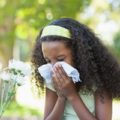
If you suffer from allergies, the last thing you want to hear is that a particularly nasty allergy season is underway. However, according to a number of experts, 2013 is going to be one of the hardest years ever for individuals who are allergic to common irritants like pollen and mold.
In a Fox News article published on March 18, adult and pediatric allergy specialist Dr. Clifford Bassett wrote that climate change and increased greenhouse gases have led to an "explosion of powerful pollens." As if that's not bad enough, he states that pollen season – which has already begun – is expected to last four weeks longer than normal, extending into mid-fall.
Additional environmental factors, such as the effects of Hurricane Sandy, the superstorm that ravaged the East Coast in the fall of 2012, will also contribute to a rise in allergens, states Yahoo! News. People in the Northeast whose homes were flooded have already been battling mold infestations over the past few months, and now they'll be stuck dealing with an influx of pollen, too.
"We found that the previous year's precipitation was a major impact on the following year's pollen production," allergy specialist Dr. Leonard Bielory told Yahoo! "Sandy and snowstorms will increase the pollen production in the Northeast severalfold."
Unfortunately, this new trend of worsening seasonal allergies isn't expected to subside anytime soon. In fact, according to Dr. Bielory, experts predict that pollen counts will grow 20 percent by 2020.
With all this information in mind, it's a good idea for allergy sufferers to do whatever they can to minimize their symptoms. In addition to seeing a specialist and taking any prescribed medications, you may want to consider investing in a whole house air purifier, which removes allergens directly from the air.









